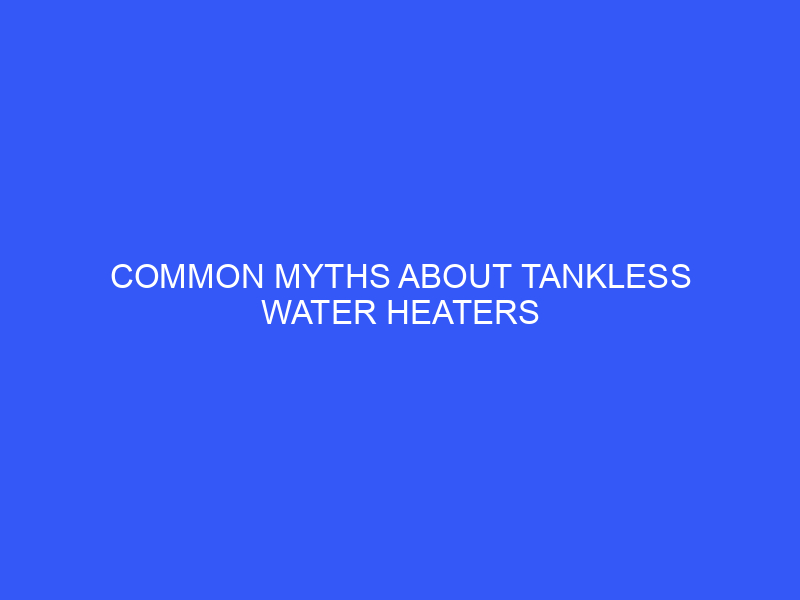Tankless water heaters might be an excellent solution for many homes. Still, you should be aware of several myths about their performance, efficiency, and usefulness. Keep reading to understand the truth behind some of the most frequent tankless water heater myths for a more balanced, realistic perspective.
Tankless Water Heaters Are Unproven New Technology
Reality: False
Tankless water heaters have been utilized overall for over 60 years. They are the norm in the vast majority of the world; you’d be unable to find a tank-style water heater anyplace in Europe or Asia.
Tankless Water Heaters Reduce Water.
Reality: False.
If you have low water pressure with a tankless water heater, you need the correct model for your household’s water demand or flow rate. A tankless water heater, when properly built, will produce hot water within 2 degrees of the chosen temperature. Water pressure is only limited to obtaining that temperature when the model cannot keep up with the pressure difference.
Tankless Water Heaters Waste Water And Take A Long Time To Get Hot Water To Fixtures.
Reality: False.
Water flows at the same pace from your water heater to the fixture, regardless of the type of water heater! Even the most fantastic water heaters cannot heat the cold water already in your pipes, so some cold water will be released before the hot water comes. Consider placing your water heater closer to the fixture if you want to reduce the amount of cold water. Alternatively, speak with an expert about installing a recirculating pump.
Tankless Water Heaters Require A Lot Of Expensive Maintenance.
Reality: False.
Tankless water heaters do not have the same mineral buildup and corrosion as tank designs because they do not have a holding tank. Unless you are on a well, we recommend maintenance cleaning every other year, whereas manufacturers recommend it annually for tank-style water heaters.
Tankless Water Heaters Provide Instant Hot Water.
Reality: Not precisely.
The benefit of tankless water heaters is that they deliver virtually limitless hot water. The magnificence of tankless water heaters is that they give perpetual hot water. Water is heated as it passes an intensity exchanger, so it’ll be heated for however long water is coursing through your unit. The cold water in the lines must be pushed through before the hot water shows up at your fixture.
If the wait is too long, contact a plumber to confirm that you have the correct model for your home, that its settings suit your needs, and that a recirculation pump is suitable for your home.
Tankless Water Heaters Cost More To Operate And Don’t Save Energy.
Reality: Mostly false.
A gas whole-house tankless water heater will save energy per gallon of hot water because you are not always keeping the water hot. (Depending on size, if an updated electricity supply is required, electric tankless water heaters may be more expensive in the long term than gas.) Furthermore, tank-style water heaters lose efficiency over time as minerals and silt accumulate in the tank; tankless models do not have this problem.
Tankless Water Heaters Cost A Lot More Than Tank-Style Water Heaters.
Reality: False.
To some extent, “cost a lot” is subjective; some households appreciate low monthly expenditures, while others prefer to spend less upfront. However, tankless water heaters are cheaper and last longer than tank-style heaters. Consult your plumber to determine which models suit your house, lifestyle, and budget.
All Tankless Water Heaters Are The Same, And Anyone Will Work In Your Home.
Reality: Not at all!
Water heater manufacturers produce a variety of models for good reason: each household is unique. Your family size, water usage trends, and even the layout of your home can all influence which model is ideal for you. That is why it is critical to find a business that understands tankless water heaters from top to bottom: not just repairing and servicing them but also selecting and installing them.
The Venting From A Tank Water Heater Can Be Used On A Tankless Water Heater.
Reality: False!
Venting is intended to transfer exhaust gasses to the outdoors safely. There are many venting options for regular tank water heaters, direct vent tank water heaters, and tankless water heaters. For both safety and carbon monoxide poisoning considerations, the venting should always be manufacturer/factory-approved for the installed unit type. For safety concerns, there are even safety rules that govern the distance of a specific kind of vent from windows and air-conditioned spaces. Exhaust fumes can be as deadly as gas, so always speak with an expert when working with any gas equipment and venting.
Outdoor Tankless Water Heaters Freeze In The Winter.
Reality: Mostly false.
A tankless water heater can be installed in almost any place in the home, and some are even meant to be installed outside. Our warm winters in the Southeast mean that freezing is rarely a concern. If temperatures are expected to stay below freezing for more than 24 hours, leave a slow stream of hot water flowing overnight to keep water moving through the pipes and preventing freezing. This is also advised for tank-type water heaters.
FAQ’S
What is the most well-known issue with tankless water heaters?
The commonest protest we get with tankless water heaters is that they don’t appear to give hot water as fast as expected. Like most tankless water heaters, if your water heater doesn’t have a buffer tank or a recirculation pump, it might require a little while for the water to warm up before it emerges from the tap.
What is the main idea behind a tankless water heater?
Tankless water heaters heat water instantly and do not require a storage tank. When a hot water faucet is switched on, cold water runs through a heat exchanger in the unit, which is heated by either a natural gas burner or an electric element.
How many tankless water heaters does a house need?
Larger families that use more than 85 gallons daily will likely require two tankless systems or the most significant available type. One unit should be enough for modest families using less than 40 gallons daily.


